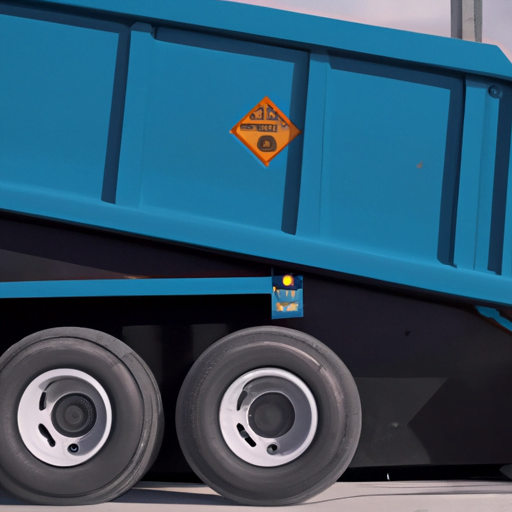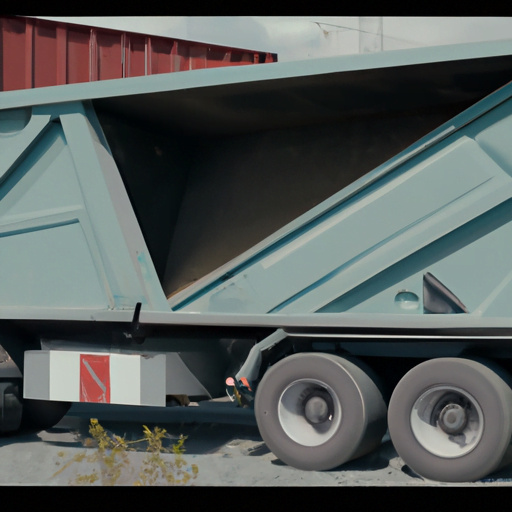-
Table of Contents
Introduction
A heavy-duty dump trailer is a versatile tool that plays a crucial role in large-scale projects, construction sites, and agricultural operations. However, its efficient use requires an understanding of the common mistakes committed while handling these powerful machines. This article aims to provide valuable insights on five prevalent errors that individuals should steer clear from when operating a heavy-duty dump trailer. The mistakes we will explore involve improper loading strategies, incorrect hitching processes, inadequate maintenance routines, lack of safety measures and inappropriate driving behavior with loaded trailers. Awareness about such pitfalls can help you increase your productivity levels and enhance the longevity of your equipment significantly.
5 Common Mistakes to Avoid for Safe and Efficient Use of Heavy Duty Dump Trailers
Owners of heavy-duty dump trailers understand the unique set of challenges that come with handling such equipment. For those who use these powerful behemoths, knowing what common mistakes to avoid can significantly bolster both safety and efficiency. From poor maintenance practices to improper loading techniques, let’s delve into five pervasive pitfalls surrounding the use of heavy-duty dump trailers.
Firstly, at the foundation of any good dumping operation lies a solid understanding of weight limits. Overloading is by far one of the most frequent missteps made by operators. Even though these formidable machines were built to haul hefty loads, there are still defined weight capacity guidelines operators should adhere to strictly—either specified by manufacturer recommendation or local regulations. Should an operator choose to neglect this rule and exceed these limits out of haste or oversight, it may result in significant wear on the trailer’s structure and even cause irreversible damage over time.
Secondly, another commonly overlooked aspect is maintaining a balanced load distribution within your trailer—yet just as important as staying within weight confines. Ignoring proper load distribution can result in an unstable trailer which becomes difficult to control when moving—and precarious during unloading operations—the direct results being increased risk for accidents and a higher chance for damaging your precious cargo due primarily to abrupt tip-overs caused by uneven weights.
Moving along swiftly from our focus on loads; do not underestimate regular maintenance’s power—a sacred ritual often neglected but utterly vital nonetheless for ensuring optimal performance from your machinery while minimizing risks associated with their operation. Much like how we visit doctors for routine health checks-ups,’ preventative maintenance’ could be considered as ‘routine check-ups’ for your vehicles—to keep them running smoothly over prolonged periods while preventing minor issues from escalating towards serious mechanical faults down-the-line.
Now comes arguably one among many exciting parts about owning heavy duty dump trailers—the act itself: Dumping! However exciting it may seem though—don’t overlook crucial safety measures required when performing this task—it happens to be one of the most common areas where mistakes are made. Always ensure that your trailer is on stable and level ground before any dumping activity commences—failure to do so could lead towards disastrous tipping incidents.
Finally, we arrive at one final hurdle—one related directly with our prior point: Towing safety! This is a commonly overlooked factor in heavy-duty dump trailer operation. It may not seem like much initially; however, unwise haste in wanting to get back on the road can lead operators into forgetting crucial pre-departure checks—a lapse resulting in preventable accidents. Remember, always thoroughly inspect everything from tire inflation to hitch connections and brake system functionality before you commence your journey.
In conclusion—it’s undeniably evident: mastering these complex machines requires constant vigilance across several facets—all requiring careful attention for safe and efficient operations—from weight management right through proper maintenance regimes while ending off with vital safety check routines. Following this guide should help users avoid these five common pitfalls when using a heavy-duty dump trailer—paving their way towards becoming not just more competent—but safer operators as well.
Understanding the 5 Frequent Errors in Operating Heavy Duty Dump Trailers: A Guide to Avoidance
When it comes to operating heavy-duty dump trailers, many users often stumble upon several common pitfalls that may lead them to frustrating issues and sometimes even costly damage. Here we discuss the five most frequent errors in handling these beasts of burden—and ways to avoid them.
Firstly, one of the most rampant mistakes is overloading your trailer. It’s not unusual for people to think their trailer can handle more weight than its designated capacity—until problems ensue. While heavy-duty models are built with robust structures capable of bearing significant load, they still have a limit called Gross Vehicle Weight Rating (GVWR), assigned by manufacturers based on their design specifications and safety considerations. Loading beyond this limit poses serious risks including loss of control while driving, brake failure or irreparable damage to axles and suspensions. Always double-check the GVWR listed in your owner’s manual before loading up your trailer.
Second error—and almost equally as common—is poorly balanced loads. A harmoniously distributed load ensures stability during transportation; conversely an unbalanced load detracts from it—it can lead to hazardous situations like tipping over when taking turns or increased wear-and-tear due to uneven pressure distribution on tires and suspension system. To evade such troubles, divide cargo evenly across the deck area so front-to-rear and side-to-side weight distribution remains within acceptable limits.
Then there’s improper hitching—a third mistake that too many tend get wrong which potentially leads to runaway trailers causing accidents! Correct coupling involves securely attaching the tongue or pivot point of your trailer onto towing vehicle’s hitch receiver using right hitch ball size along with safety chains as backup connective measure—all ensuring stable connection preventing accidental uncoupling whilst driving on roadways.
An associated concern worth mentioning next—the fourth blunder—is neglecting routine maintenance checks before hitting roads with fully loaded trailers. Just like any other machine you use daily—your car for instance—your heavy duty dump trailer also needs regular attention. Checking tire pressure, ensuring lights and brakes are functional, inspecting hitch system for wear and tear—these are all small but crucial steps that contribute towards safe journeys as well as longevity of your trailer.
Finally let’s touch on the last mistake: lack of training or knowledge about driving with trailers. Driving a vehicle attached to a behemoth like a heavy-duty dump trailer requires special skills and attentiveness—not taking turns too quickly to avoid jackknifing, maintaining larger following distance due to increased stopping time—are just basic examples here. If you’re new to towing life it would be beneficial investing some time learning about adjusting driving habits accordingly or even considering professional training courses that teach specifics of such operations.
All said and done, operating heavy duty dump trailers is not an intricate science; however ignoring these common mistakes might turn what should have been productive hauling tasks into dreadful experiences filled with mishaps. Being mindful about carrying right amount of load in balanced manner while ensuring secure attachment along with regular maintenance checks—and perhaps most importantly adapting one’s own driving style—these pointers can assure pleasant experience each time you hit the roadways with your trusty heavy-duty companion!
Maintaining Your Equipment: Top 5 Missteps When Using a Heavy Duty Dump Trailer
When it comes to efficiently managing construction, landscaping or farming operations, nothing beats the utility of a sturdy, heavy-duty dump trailer. However, as useful and efficient these machines are, they require particular attention and skillful operation to ensure their longevity of work. Even the most experienced may occasionally overlook some factors leading to frequent mistakes while using this machinery. Let’s delve into five common missteps when using a heavy-duty dump trailer.
First off: overloading your trailer,you might be tempted by that extra bit of gravel or topsoil–after all your machine was built for toughness right? Unfortunately not quite so simple; every machine has its limit. Not adhering strictly to load capacity guidelines can lead to immediate trauma like blowouts or gradual damage such as undue wear on brackets that eventually cause failure. Adhere religiously to manufacturer recommended weight limits.
Secondly we have poor weight distribution – even if you’re underweight limit but don’t distribute loads evenly throughout your trailer bed- well let’s say things can get quickly out of hand there too! Uneven loads put unnecessary stress on one part rendering other components prone to eventual breakdowns besides difficult control.
Maintaining tire pressure is another imperative action often overlooked which truly can’t be emphasised enough here folks . A low-tire pressure compromises stability whilst hauling creating dangerous situations not only damaging equipment but also risking safety at workplace hence regular checks before loading trailers should become an integral practice ritual in order maintain safety first always .
Common mistake number four misjudges how critical accurate hitching really matters in context of long-term use . Securing incorrect hitch size connections between tow vehicle and dump creates sloppy connection increasing chances accidents due seismic shifts weights during movement time again.
Finally what about maintenance? Just like any piece equipment , diligent care vital keep running smoothly years come neglect unforgiving beast unfortunately would render useless no matter initial investment made resulting downtime missed deadlines costly repairs avoidable had routine schedules been kept .
So there you have it, the top five common mistakes to avoid when using a heavy duty dump trailer. Always respect weight limits and distribute loads evenly. Regularly check tire pressure and ensure the correct hitching practices. Last but not least maintain diligent care routines for your equipment.
By avoiding these typical slip-ups, users can extend the lifespan of their trailers, optimize productivity levels at work sites ,and most importantly ensure safety overall . It’s crucial remember while they’re built be tough robust even best machines need TLC ! Save yourself aggravation potential loss adopting these wise practices right from get-go or if already use perhaps time reassess how well truly handling machinery?
Remember, taking care of your tools is as important as any job you’ll do with them – treat them right and they’ll return favor in spades! So let’s give that heavy-duty dump trailer some love it deserves keep running like clockwork job after job year after year. Your bottom line will surely thank you for it!
Q&A
1. Question: What is a common mistake to avoid when loading a heavy duty dump trailer?
Answer: One common mistake is uneven loading, which can cause the trailer to tip or make it difficult to unload materials. It’s important always to distribute weight evenly across the base of the dump trailer.
2. Question: Why should I be cautious about overloading my heavy-duty dump trailer?
Answer: Overloading is another common mistake. It not only wears down your equipment faster but also poses risks such as impaired handling and braking, potential tire blowouts, and structural damage due to excessive strain on the frame.
3. Question: Are there any mistakes linked with maintenance that could impact performance?
Answer: Yes, neglecting regular maintenance checks can lead to serious issues in the future. Failure in inspecting for damaged parts or ignoring routine servicing like cleaning after use can result in malfunctions during operation.
Conclusion
In conclusion, using a heavy-duty dump trailer requires careful handling to avoid common pitfalls that can lead to accidents or damage. These mistakes include overloading the dump trailer beyond its capacity, which compromises stability and safety; neglecting regular inspection and maintenance of crucial parts like brakes, tires and hydraulic systems; improper loading which affects balance during transport; disregarding safety protocols such as ensuring the dumping location is secure before tipping; and lastly ignoring operator training leading to misuse or mishandling of the equipment. Avoiding these errors ensures longevity of your heavy duty dump trailer while promoting efficiency and safety in operation.


